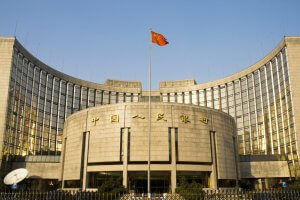China’s Central Bank Cuts Rates, Again. More Bitcoin Adoption in the Offing?

China’s central bank has cut its benchmark lending and deposit rates again in an attempt to stir a stuttering economy.

The People’s Bank of China, the authority as the Chinese Central Bank has cut its rates and lowered the minimum ceiling of cash reserves that banks must hold, in order to try and shake up some
activity to spur a slowing economy.
Reuters reports that it is the sixth time since November last year that China has slowed down on its monetary policy by slashing its interest rates in the face of stagnating growth and prolonged weak inflation.
The People’s Bank of China announced that it would bring the one-year lending rate down to 4.35 percent, cutting one-quarter of a percentage point effective this Saturday. Similarly, the benchmark deposit rate would also be lowered down by the same amount, bringing it down to 1.5 percent.
Growth at its slowest since the financial crisis
China’s growth has slipped down to 6.9 percent in the third quarter, below the 7 percent growth target set by the government. The decline is the weakest expansion in a quarter since 2009, a time when the world was reeling from the financial crisis.
China is experiencing falling demand in an economy with an ever-increasing industrial capacity. Inflation isn’t helping either, a chart that’s rising predominantly due to higher food prices.
As recently as Monday, the country’s state-controlled media reported that Chinese Prime Minister Li Keqiang had interacted with the leaders of China’s biggest banks to reassure them of backing companies that are in financial trouble.
An excerpt from the Beijing Times writing about the meeting read that the Prime Minister offered promises that China will categorically “not cut or withdraw loans to those companies with difficulties but good market prospects,” while adding that it will help by “giving the necessary capital support to companies facing bankruptcies or regrouping.”
A Time for Bitcoin
Ten days ago, a publication by the Cyberspace Administration of China (CAC) revealed a marked change in China’s approach to bitcoin. Claiming that this is already the “post-Bitcoin era,” China acknowledged and even embraced the cryptocurrency.
Also read: This Country Has Fewer Poor Than America, 80% Of Bitcoin Transactions
Citing that China “can no longer ignore its [Bitcoin’s] revolutionary changes,” the CAC also pointed to the potential of block chain technology for decentralization in various industries.
A faltering economy, banks and financial institutions that are sweating, the falling yuan and economic inflation are all factors contributing to China being the sole reason for 80% of the global bitcoin trading volume . Bitcoin is popular in China and it’s only the beginning. As more factors emerge for the masses to look into finances and governance, there might yet be more bitcoin adoption in China.
Images from Shutterstock.